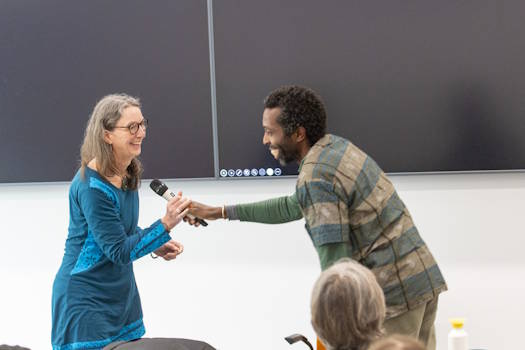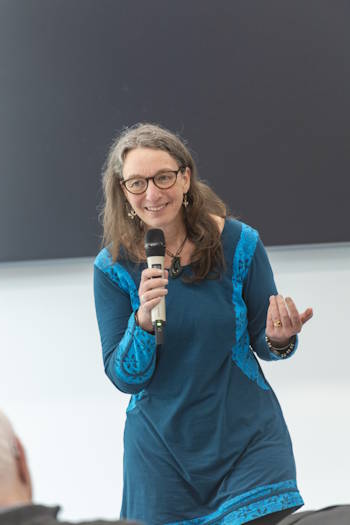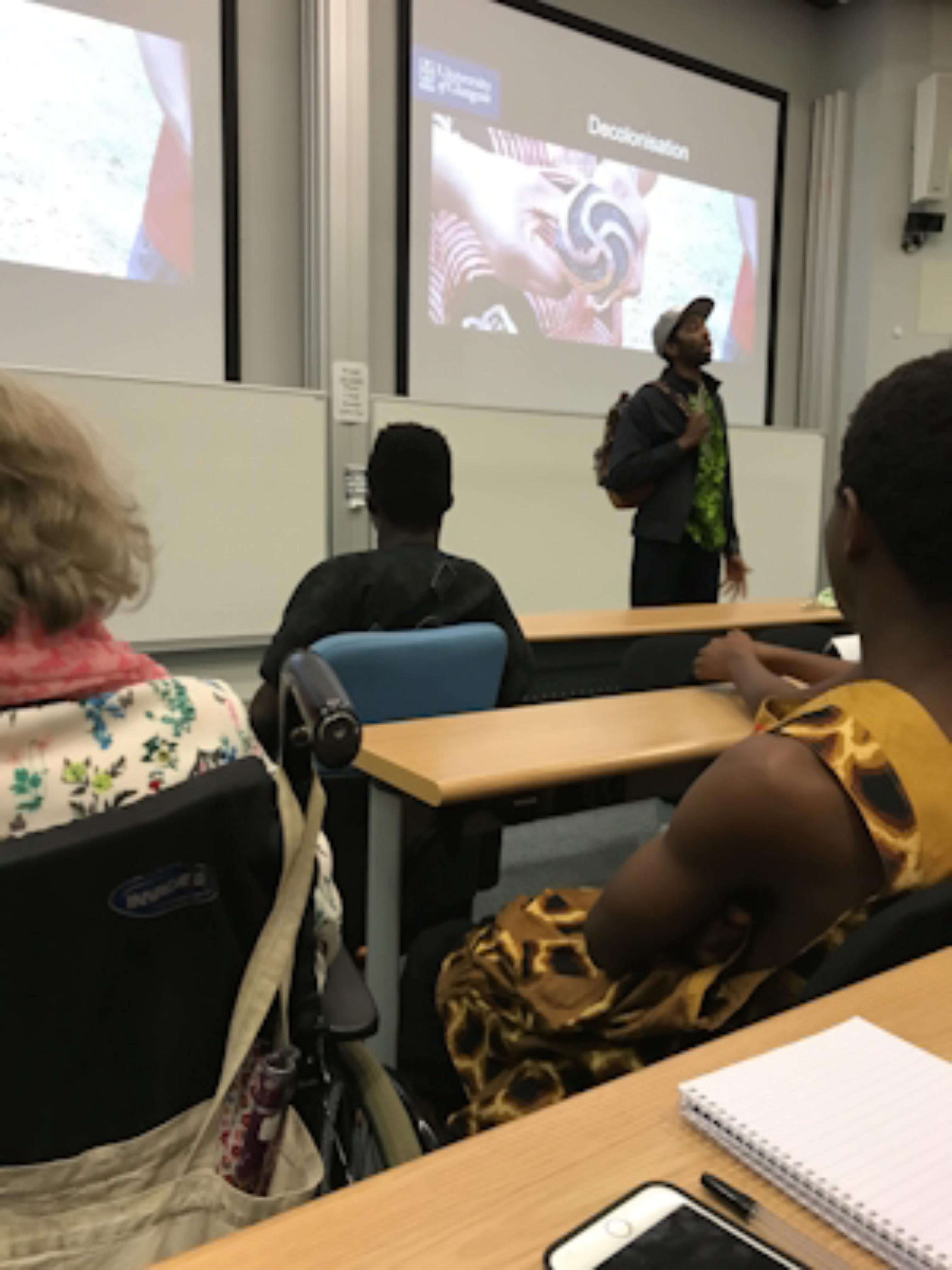Alison Phipps annual lecture 2024
The UNESCO Chair annual lecture was held on 23 May 2024 as part of the UNESCO RILA Spring School: The Arts of Integrating.
Title: Call and No Response

Abstract:
Praise be for the two green ticks
That say the starving eyes are still reading
Praise be for quiet care behind the glare that asks how to help and give
Praise be for thinkers who ask the questions that open our hearts
Praise be for the nausea that fills the throat at what we witness.
It tells us our hearts are breaking
(Phipps, 2024)
We are living through times and with experiences that our Human Rights frameworks and our human hearts and minds say should never happen and when they happen must never happen again. Yet never again happens again and again and when it does, when we experience or hear of torture, trafficking, detention, destitution, deportation, when we hear of war, of war crimes, of the breaking of international humanitarian law, and of genocide, we are lost for words. Words stop spring forth out of our mouths and hearts and minds. Words cease their flow of life, of banality and of poetry. Words fail. In such times it beholds us to examine our words and work with all of our languages and repertoires, or ways of finding meaning again and making meaning again together. The Philosopher Martin Heidegger, a problematic figure, said “Dichterisch wohnet der Mensch” (Heidegger, 1959) – "Poetically, the human dwells”.
What does it mean for words of poetry to be how we live, or find life, again, when faced with atrocity, when faced with persecution? What happens when defiantly, we work together beyond words, and with those springing from the natural well of loving greeting, to be with words that work miracles, healing, that wrap us around in the silence that can be a comfort of no words?
Drawing on the inspiration of the healing wells and word springs of poets ancient and new, and minded of Seamus Heaney’s ‘The Cure at Troy’ (Heaney, 1990) and on my own recent collection of ‘cries’ – Call and no Response focused on Gaza I’ll offer a reflection on words and their limits, and more words and their springs.
What happens when words fail?
Whose work is the restoration of words
When they are lost, or nearly lost?
What does it mean to bear witness
Against false witness
How do we ‘care for words
In a culture of lies’
(McEntyre, 2009)

Alison Phipps annual lecture 2023
The UNESCO Chair annual lecture was held on 11 May 2023 as part of the UNESCO RILA Spring School: The Arts of Integrating.
Title: A Permaculture Ceilidh: Designing Restorative Sanctuaries

Abstract:
“O body swayed to music, O brightening glance
How can we know the dancer from the dance?”
(W.B. Yeats)
There is a longing in the work of this day and the Spring School, for a world where the danger and fragility, the hostility and impending doom of environmental collapse gives way to the power of hope.
Hope, as the poet says, ‘is a thing with feathers’
And over the pond
in its first season
a family of coal tits
Fledged
as I rocked back and forth
under the apple blossom
and the rambling rose
edged into bloom.
It is from these roses, edging in bloom, that the work of sanctuary making and managing might be understood anew.
In this annual UNESCO RILA lecture, Alison will take you into the philosophies, principles and practices of permaculture design which have come to inform her work. She will introduce permaculture and the place-based sites of re-indigenising which are at the heart of the vision of integration she proposes. Through this presentation of the possibilities of permaculture as a ceilidh of all creatures – human and more than human – of the tangible and intangible, of the sociable and intercultural she will break the fourth wall between scholarship and life; and ‘dehyphenate’ work-life balance’ (worklife; ikigai; mahi) in a bid to show how educating and designing for more permanent and sustaining forms of being and practice can centre the ordinary, over the extraordinary, the possible over the impossible, the creative over the necropolitical and work from histories of war and colonality towards something tangible which responds to the poet’s question: ‘how can we know the dancer from the dance?”
Expect intimacy, poetry, war and peace and things with feathers that sing.


Alison Phipps annual lecture 2022
This lecture was held on Friday 13 May 2022, as part of the UNESCO RILA Spring School: The Arts of Integrating.
Title: Cry Freedoms: Sticks, stones and the Value of Sharing
Abstract:
At Nehanda’s tree
The boys are selling onions,
Cheap plastic imports
From China,
They are advertising stump dressing
And the killing of bees.
At the end of 2021 David Graeber and David Wengrow published their joint work entitled The Dawn of Everything: Towards a New History of Humanity. It is one of the most provocative and exciting works of generosity and humble scholarship that the academy has received in years. Whilst many of the ideas in and of themselves are not new the work synthesises work in archaeology, anthropology and the history of ideas and cultures in such a way as to allow for new grand value-based narratives to begin to emerge following the proclamations of the ‘death of grand narratives’.
In this synthesising talk, catching the values shared during the spring school I will explore the implications of Graeber and Wengrow’s synthesis and leading ideas for our work. I’ll look at what it is that shapes our ideas of what is valuable, and how value accrues to objects and ideas such that they become points of restoration or violence. In particular I’ll explore the themes relating to migration and freedom, and to craft. How is it certain languages carry value or certain kinds and others do not? What does it mean for something to have ‘currency?’ and what can we learn from the work of integrating the things we value collectively to sustain the work of peace and justice for all. And most importantly, in the quest to be better humans, what can we learn about how we work with values, virtues and valuables?
Alison Phipps annual lecture 2021
On Friday 28 May 2021, Professor Alison Phipps delivered her annual lecture at the UNESCO RILA Spring School: The Arts of Integrating. The lecture was held online.
Title: Masquer'aide. Covering and Recovering.
Alison Phipps annual lecture 2020
During the covid-19 pandemic, Alison Phipps delivered her annual lectuer online, in collaboration with the Scottish Refugee Council.

Title: Fostering Integration: making refuge real through the arts of justice & contemplative seeing.
With UNESCO RILA's Hyab Yohannes, Hannah Thomas, Dr Giovanna Fassetta & MIDEQ’s Dr Gameli Tordzro, Naa Densua Tordzro & Tawona Sitholé.
Scotland has as her goal to be a society where all can flourish.
The discourse surrounding refugee integration is regularly equated with assimilation, despite significant work to critical work; intense policy programmes and legal frameworks of rights, equality, diversity and inclusion. Even when the policy and law does not operate with an assimilationist model, in practice, it is what people do. It then intersects with paradigms of race, language, gender and class to perpetuate the things which do us all harm; which prevent the flourishing. A deathliness pervades the margins – drownings, detentions, destitutions, deportations.
Hostility; violence; structural and systemic injustice, lesser opportunities for the many not the few – these are not going to lead to flourishing.
Flourishing meadows, need flourishing margins. They need to be fostered, not just welcomed.
The dominate discourse in refugee integration and since 2015 has been one using the terminology of welcome and hospitality. But that’s only the start of the story. What happens after the welcome and how do we really do the hard, piece by piece work of justice, and what Simone Weil calls ‘decreation’ to create in the bodies, homes, communities and institutions that make up our lives?
This lecture – a collage of offerings centred around a examples where a sustained non-violent practice has been fostered; ‘contemplative seeing’ (Dustin & Ziegler, 2006) and Menakem’s (2017) operationalisation of historical trauma healing through ‘clean and dirty pain’ with ‘people of culture’.

Alison Phipps annual lecture 2019
On Saturday 22 June 2019, at the Solas Festival, Professor Alison Phipps delivered the UNESCO Chair annual lecture.
Abstract:
Decolonising is the word of the moment. For those seeking refuge and seeking to integrate their ways of life with the ways of life of others it offers a mode of hospitality. It can be freeing, it can be uncomfortable, it can be physical. It is emotional. And it is a journey.
In this Third UNESCO RILA lecture, Alison Phipps presented her new book Decolonising Multilingualism. The book is a poetic, activists academic exploration of her attempts at decolonising and her manifesto for decolonising multilingualism. Prof Phipps presented together with Gameli Tordzro and Naa Densua Tordzro.
The lecture was part of Refugee Festival 2019 and also marked two years of UNESCO RILA activities.

Alison Phipps annual lecture 2018
On World Refugee Day, 20 June 2018, Professor Alison Phipps delivered the UNESCO Chair annual lecture.
This lecture was part of Refugee Festival 2018 and also marked a year of UNESCO RILA activities. Title and abstract below.
Do you get my drift?: ‘Sankofa’ and the Arts of Integrating the old with the new
With Gameli Tordzro, Tawona Sithole, Naa Densua Tordzro
This lecture mines the contested concept of Integration for its history, variation and substance. It considers the important work of law and social policy in developing frameworks and duties for integration, especially with regard to the work of New Scots Integration Strategy, Scotland. It then moves to examine the place of concepts of integration in conflict transformation, international relations and trauma healing. Finally it develops understandings of integration from indigenous sources of knowledge, looking at the concept of sankofa, indigenous practices of integration, and the decolonial thought.
With the new focus on languages and arts in the processes in individual and intercultural integration the lecture will work multilingually and artistically, as well as through more traditional forms of research presentation.

News item 15 May 2018UNESCO Chair - World Refugee Day Annual Lecture
News item 14 June 2018
180620 Annual Lecture on Scottish Refugee Council Blog
Alison Phipps inaugural lecture 2017
On World Refugee Day, 20 June 2017, Professor Alison Phipps delivered her UNESCO Chair inaugural lecture.

Hospitality is integration - it is everybody's work
On World Refugee Day, The University of Glasgow played host to the Inaugural lecture of the UNESCO Chair in Refugee Integration through Languages and the Arts. The Ha Orchestra welcomed the audience to an unusual event, one that broke a little with the academic tradition, one that was full of song and dance, but also lament for those members of Ha Orchestra and Noyam Dance Institute who could not be with us due to refusal and delay with the arduous visa application process.
The event marked the start of Refugee Festival Scotland 2017, and opened with a welcome from Senior Vice-Principal, Neal Juster and an overview of activities of UNESCO in UK by the Chair of the UK National Committee for UNESCO, Dr Beth Taylor. Dr Taylor reflected that history has proven that international cooperation in science, culture and communication can promote lasting peace. Poignant words in our current time. The UKNC for UNESCO featured the launch of the chair in their latest newsletter.
Prof Alison Phipps explored the role language and arts play in societal integration and the creative processes at work in intercultural encounters. She offered a critique and development of existing understanding of integration. She proposes a move away from functional, countable deficit models of integration to a multilateral process that involves all of us. Integration is the art of making culture, rather than remaining unchanged, absorbing newcomers into it.
Decolonisation in action – the lecture was interrupted by Tawona Sitholé, Artist in Residence with the UNESCO Chair, performing his work “Border Crossing in Togo”. The lecture was punctuated by song by Naa Densua Tordzro, with music and dance from the Ha Orchestra (Artistic Director Gameli Tordzro is also Artist in Residence with the UNESCO Chair) and Noyam African Dance Institute.
Professor Alison Phipps repeated her lecture during the Solas Festival (23-25 June 2017, The Bield, Perthshire) where she curated a strand of talks and performance events.
Background:
The University of Glasgow has been invited by UNESCO’s Director General to join its prestigious universities network (the UNESCO Chairs) and establish the first UNESCO Chair in Refugee Integration through Languages and the Arts. The Chair will be held by Professor Alison Phipps OBE, PhD, BA (hons), FRSE, FRSA, FAcSS, and is the first UNESCO Chair to investigate Refugee Integration.

Tawona Sitholé performing Border Crossing in Togo.
Noyam African Dance Institute performing part of their show Broken World Broken Word.





